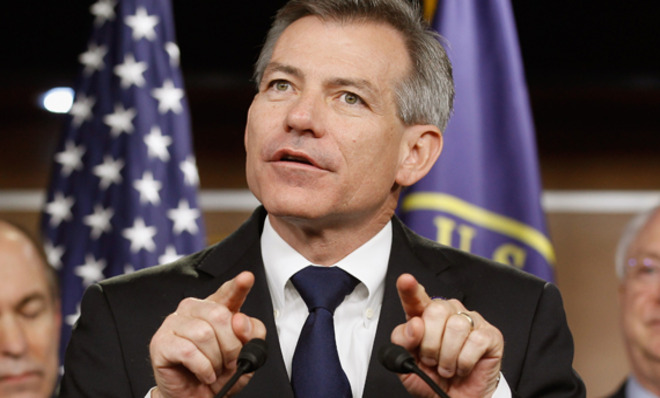3 crazy arguments from debt ceiling deniers
Default is just "rhetorical flair"

A free daily email with the biggest news stories of the day – and the best features from TheWeek.com
You are now subscribed
Your newsletter sign-up was successful
Thursday morning, in testimony before the Senate Finance Committee, Treasury Secretary Jack Lew called out Washington's "debt ceiling deniers," the growing number of Republican lawmakers pushing back against raising the debt ceiling.
"It is irresponsible and reckless to insist that we experience a forced default to learn how bad it is," Lew told the committee. "We now find ourselves on the precipice with some Republicans once again threatening default."
What happens if a default does occur — if Congress fails to raise the country's debt limit and the Treasury is unable to meet its obligations — is still a big unknown. But the consensus among most economists, those on Wall Street, and a large majority of Washington is that whatever happens, it won't be good.
The Week
Escape your echo chamber. Get the facts behind the news, plus analysis from multiple perspectives.

Sign up for The Week's Free Newsletters
From our morning news briefing to a weekly Good News Newsletter, get the best of The Week delivered directly to your inbox.
From our morning news briefing to a weekly Good News Newsletter, get the best of The Week delivered directly to your inbox.
Derek Thompson at The Atlantic says we're expecting "a scramble to prioritize payments, delayed checks to groups like veterans and senior citizens, and angry, confused investors," but that "the truly scary thing is that we actually have no idea what will happen."
Not everyone hesitates to forecast the aftermath of a debt default, however — and some opinions map it, in the long run, as falling somewhere between the economic equivalents of a nuclear holocaust and the return of Christ. Bloomberg's Yalman Onaran said it would likely be a "catastrophe dwarfing Lehman's fall."
Despite these altogether terrifying prognostications, a slice of Republicans, as Lew says, are maintaining that no — we don't really need to raise the debt ceiling. The main argument seems to be that we could avoid catastrophe by prioritizing some debts over others — a fine idea, but the Treasury department has no legal authority to do that.
Other arguments stray even further from reality. Here are three particularly nutty ones:
A free daily email with the biggest news stories of the day – and the best features from TheWeek.com
It's all semantics
Rep. David Schweikert (R-Ariz.) recently told The Arizona Republic that he isn't worried about a default. Why? Because default is just "rhetorical flair" that has no basis in reality:
The president of the United States has been disingenuous by using language like 'default.' Much of the rhetorical flare out there is not based in math. ... They try to use that language to raise the shrillness for political leverage rather than trying to work through this with a calculator. [AZCentral.com]
The problem is that the Treasury Department has already said that prioritizing payments to bondholders, which Schweikert is referencing here as an alternative to default, is "simply default by another name," to quote Treasury Secretary Lew in a letter to House Speaker Boehner. "There is no way of knowing the damage any prioritization plan would have on our economy and financial markets," Lew wrote.
It will bring stability to world markets
In an interview with The Washington Post last week, Rep. Ted Yoho (R-Fla.) said the ultimate outcome will be positive. "'I think we need to have that moment where we realize [we're] going broke.. I think, personally, it [a default] would bring stability to the world markets.'"
That's most likely nonsense. Here, a counterpoint prediction from a report the Treasury Department sent out earlier this month:
A default would be unprecedented and has the potential to be catastrophic: Credit markets could freeze, the value of the dollar could plummet, U.S. interest rates could skyrocket, the negative spillovers could reverberate around the world, and there might be a financial crisis and recession that could echo the events of 2008 or worse. [Treasury.gov]
It will only effect Washington
Richard Burr, Republican senator from North Carolina, said this week that he was "not as concerned as the president is on the debt ceiling, because the only people buying our bonds right now is the Federal Reserve. So it’s like scaring ourselves."
As Politico points out, the problem with that argument is it "ignores that nearly $6 trillion — almost half of outstanding debt held by the public — is owned by foreign governments, including $2.4 trillion by China and Japan alone. Both of those nations this week warned the United States against doing anything that would put these massive investments at risk."
Carmel Lobello is the business editor at TheWeek.com. Previously, she was an editor at DeathandTaxesMag.com.
-
 Why are election experts taking Trump’s midterm threats seriously?
Why are election experts taking Trump’s midterm threats seriously?IN THE SPOTLIGHT As the president muses about polling place deployments and a centralized electoral system aimed at one-party control, lawmakers are taking this administration at its word
-
 ‘Restaurateurs have become millionaires’
‘Restaurateurs have become millionaires’Instant Opinion Opinion, comment and editorials of the day
-
 Earth is rapidly approaching a ‘hothouse’ trajectory of warming
Earth is rapidly approaching a ‘hothouse’ trajectory of warmingThe explainer It may become impossible to fix